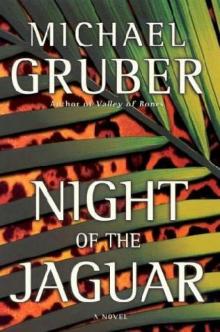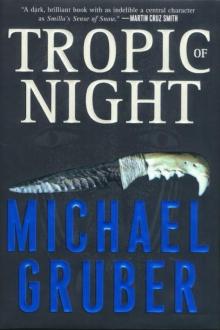- Home
- Michael Gruber
Tropic of Night jp-1 Page 5
Tropic of Night jp-1 Read online
Page 5
Puffing contentedly, he turned off Dixie Highway at Douglas Road and then onto Ingraham. The roadside trees had not fully recovered from the ravages of Hurricane Andrew in ‘92, and Ingraham was not yet the continuous lush tunnel it had once been, but it was cooler and shadier in here than on the unforgiving sun-blasted Dixie Highway. Fairchild Tropical Gardens, his destination, is the largest tropical arboretum in the nation and a center for the study of tropical botany. It, too, had been knocked flat by Andrew but was nearly back to where it had been, a small paradise of lush growth and flowers. Paz flashed his badge at the gate guard and parked in the shadiest corner he could find. The heat of the day was building to its usual apex. Afterward, around three-thirty, when the air was nearly too thick and hot to suck into the lungs, it would be doused by the predictable thunderstorm. Now dense scent hung in the unmoving air: rot, divine perfume, clipped grass. Paz took a deep cleansing snort of this, and strolled past the fish pond and the immense banyan to the two-story gray Florida limestone building that housed the research and administration offices.
After a few false turns he found himself in the office of Dr. Albert Manes, a gangling, pleasantly ugly fellow about Paz’s age, tanned, spectacled, and looking very much the intrepid plant explorer in a green T-shirt and khaki shorts. He took Paz’s card with interest.
“A cop, huh? Looking for dope in the garden again?” He grinned.
Paz kept his face blank. “No, sir, this is in reference to a homicide.”
Manes’s face took on a suitably chastened look. “Wow, who got killed?” he asked, and then paled. “Oh, shit, wait a second, you’re not here because …” His eyes darted over to a family portrait on his desk.
“No, sir, nothing like that. We just need a little botanical advice.”
Manes took a deep breath, blew it, laughed nervously, and sat down on the edge of his desk. “Sure, what about?”
Paz handed him the thing in its evidence bag.
Manes peered at it, holding the bag up to eye level. He sat on a steel stool, took the nutshell from its bag, examined it in a hand lens, measured it, took down a thick green volume from the shelf above him, thumbed through it for two minutes, and said, “Here it is.”
Paz looked past his shoulder at the open book. There was a black-and-white photograph of a similar nutshell joined to its mirror image at the narrow end.
“It’s Schrebera golungensis, ” said Manes. “The ewe’s-foot tree. Also called the opele tree, although what an opele is I couldn’t tell you. Did you want to know anything else besides what it is?”
“Does it grow around here?”
“Well, it probably would, everything else does. But it’s native to West Africa, Nigeria down though the Congo and up to Senegal.”
“Have you got one here? In the gardens, I mean.”
“Alive and growing? I could check our database, if you’d like.”
Paz would like, and the scientist sat down in front of a large monitor and started pressing keys. Lists scrolled, windows flashed into existence and vanished.
“It doesn’t look like we do. If you made me guess, I would doubt that anybody else in Miami does, either.”
Paz wrote this into his notebook. “What do they use this tree for? I mean, they eat the fruit, or what?”
“Oh, it’s not a cultivar,” said Manes. “This grows wild in the jungle. The locals might use parts of it, but I’m not up on that kind of thing. If you have a couple of minutes, I could check on the Net.”
“Let’s do it.”
Manes punched keys. The computer warbled and hissed.
“I’m in the EthnobotDB database. Uh-uh. No S. golungensis. There’s a related Schrebera used in folk medicine.”
“How about to make poison?”
“Poison. Okay, that’d be the PLANTOX database. Just a second, here. I’ll just check out the genus for starters. Nope, a blank. Which doesn’t mean actually that much. These general databases are always a little behind the curve. You need an ethnobotanist.”
“Isn’t that you?”
“No, I’m a plant systematist. I figure out which plants are related to which and also decide if something somebody collected is a new species or not. An ethnobotanist actually goes out and works with locals to see how they use plants. Drug companies hire them in platoons.”
“Got a name of one I could talk to?”
“There’s Lydia Herrera, she’s pretty good, at the U. I know she’s around because I just saw her the other day. Your problem’s going to be finding someone who knows West Africa, assuming you’re interested in this particular tree.” He paused. Paz could see he was about to expire from curiosity thwarted, and was not surprised when he asked, “So … what’s the connection between the specimen and the murder? If I may ask …”
“You could, but I couldn’t tell you anything. Sorry, it’s procedure.”
Manes chuckled and said wryly, “Yeah, and of course, an unusual tropical plant is connected to a murder, you can’t tell, it could be a tropical botanist did it.”
“Could be,” said Paz, unsmiling. “For the record, did you know the victim, Deandra Wallace?”
A short nervous laugh. “No, not that I know of. Who was she?”
“Oh, just a woman, up in Overtown. Back to what you were saying, about finding someone who knew about Africa?”
Manes seemed relieved to get back to his field. “Right. Well, most of the ethnobotanists in this part of the world are going to have experience in the American tropics?makes sense, of course, we’re close and we have political and economic connections with Latin America. Most of the West African botany’s been done out of France, and the East African out of Britain, for obvious reasons, the former colonial powers. I’m sorry I can’t help you more.”
Paz finished writing and put away his notebook, thanked Manes, and collected his nut from the table. His opele nut. An accomplishment to know its name. Back at his car, he sat in the front seat with the door open and read through his notes. He always did this after an interview; it was another one of Barlow’s rules. Make sure you got what you want before you leave the informant. In all, good news. The crime scene contained a rare nut, which was better than if the thing was growing all over South Florida. He had actually written “rare nut.” You could say that again, he thought, and laughed. It was a shame he couldn’t share it with Barlow. He used his cell phone to call the University of Miami locator, and then called Dr. Herrera’s office, using Manes’s name but not identifying himself as a detective, making an appointment with the secretary for later in the day.
Paz drove out of Fairchild and turned north. A rare nut. He thought it would be nice to find the other half of that particular Schrebera golungensis shell. He had a thought and pulled out his notebook and, stopped for the light on Douglas, he made a note to ask Lydia Herrera if she knew why the thing had a little hole drilled in either end.
FOUR
It’s peanut butter and jelly for lunch today in the Bert and Ernie lunch box and a banana and four Fig Newtons and orange juice in the little thermos bottle. Luz has discovered her appetite and is looking a little less peaky now, a little less like a starveling sparrow. Her hair is glossy and held by two pink plastic barrettes in the shape of bows. It reaches down to the small of her back. I’ve dressed her in a navy T-shirt, denim shorts, and red sneakers. If this is ever over and we survive, I’ll buy her something pretty, I swear it. I’m wearing my office costume, which today is a shapeless cotton bag printed with vomit-colored picturesque ruins, a degraded Piranesi effect. My legs are bare and stuck into what we used to call health shoes, the precise color and near the shape of horse droppings. It took me a while, but I believe I have found the most unattractive hairstyle for the shape of my face, which is angular, with what my mom always called good cheekbones. I have taken much of the good out of them by choosing blue plastic harlequin eyeglasses, with lenses that tint themselves automatically in sunlight. The lenses tend also to obscure my eyes, which are pale gray-green i
n color. I try not to look people in the eye in any case, and I don’t imagine there are many at my place of work who know what color they are. The hairdo and glasses make me look ten years older, and quite retired from the sexual sweepstakes. Which I am.
We leave the apartment, after a brief altercation about bringing her bird book to day care. They frown on personal items at day care, as it causes quarreling, a lesson we should all take from preschool and apply to our lives. Actually, I am pleased that she objects. It is a good sign, she having spent her little life so far as a terrorized punching bag. She loves that bird book, especially the section on the care and feeding of young birds. The mother bird shoves food down the gaping maw of the baby bird. She gets it. The other night I fed her with bits of cookie as we read, and it made her giggle. I’m the mother and you’re the baby. Then she wanted to feed me. I let her and she said her first full sentence, in my presence at least, “Now I’m the mother and you’re the baby,” and we laughed, and I thank Saint Agnes, patroness of young girls, that the grammar engine is still intact in there under my quick kiss.
She calls me Mother, now, curiously formal, but I don’t mind at all, except she says it “Muffa,” and it sounds to me like the Olo m’fa, which literally means support, or pedestal, and signifies the squat wicker pedestal on which the babandole places his zanzoul, the ritual container in which magic elements are put to blend and generate power, ashe as they say. Figuratively, it is the world?material reality, the web of nature, upon which God has placed the Olo, and which supports them.
We leave the bird book and go out into the typically damp south Floridian morning, thickened air hanging in quasi-visible streamers from the canary allamander, the blushing oleander, the crotons colored like plastic toys, and the gray-barked fig with its insidious brown tendrils strung with beads of moisture. We climb into the Buick and I have to run the wipers because the window is covered with dew. I crank it up, and Luz turns the radio on, always set to WTMI, classical music. I dislike drums now, I do not wish to feel the beat. They are playing some passacaglia for violin, Paganini, perhaps. I turn it down. I like Mozart, Haydn, Vivaldi. And Bach best of all, the intricate order and the illusion of rules, the ghosts of protection. Quite drumless.
It is a short hop down Hibiscus to Providence Congregational Church, which dispenses, besides an unstressful vanilla religion, the best day care in Miami. There is a long waiting list for Prov, but we jumped the list over all the Brittanys and Jasons from the good side of the Grove, because of our peculiar appearance and the sad story I spun for the director, Mrs. Vance: a little African exoticism, a little heartbreaking separation, a little traumatic death, just a touch of touching impairment. A shabby white lady and her mulatto kid, striving and desperate, that was the picture. And grateful, unlike so many of the actual poor, who are so often testy and suspicious. My husband taught me a great deal about how to stimulate white guilt, and I find I can use it effectively in the service of my kid, and do. It bowled nice Mrs. Vance over and she affirmatively acted.
Providence is set in perfectly trimmed grounds on Main Highway, graced by palms and banyans and bougainvillea, a set of low structures in Spanish Mission style, red tile roofing over stucco painted pink as lips. I turn Luz over to the nice Ms. Lomax, her teacher, who coos a greeting tinged with that special tone people like Ms. Lomax use for those not so fortunate as they. Everyone and everything is nice at Providence. The milk of human kindness sloshes ankle-deep over its polished floors. The kids are brightly scrubbed and dressed in designer clothes, or darling faux-casual rich hippie stuff, and the mothers are all as shiny as their Mercs and Range Rovers. The nice makes me feel like a troll or a night-hag, or a t’chona, the river wight of the Olo, who comes at night and sits on the faces of dreamers and gives them dreams of smothering that are not only dreams. I am grateful; I want Luz to be surrounded by nice here and for her whole life, and yet I want to smash it, too; I want to open nice, plump Ms. Lomax up like a can of beans. My husband, I know, felt like this all the time, although he managed to keep it under wraps for a good long while, until he got to Africa. Africa will do that; Carl Gustav Jung took one look and ran like a thief back to cozy Zurich.
Luz goes without a backward glance, as she has from the first day. Utter security, is it, or does she not even care, like a cat? Olo children are like that, I recall, after they have made the sefune bond with their foster parents, so I suppose it’s all right. Or I’m crazy, which is always around eight-to-five probable these days.
I drive back to U.S. 1 and up to I-95, which I take to the East-West freeway and then off at Twelfth Avenue. It’s my only luxury, this driving to work. Parking and running the car cost nearly as much as my rent, but I don’t like the metrorail, the only American equivalent of African bus travel. Now that I have a child to raise, I don’t know if I can continue, although so far she’s cost little more to keep than a small dog. Perhaps I can find another source of income. It can’t have any sex in it, or drums, or smiling (cross out the ads that want personable, good with people) or snappy dressing. Computers? I know how to use one, and perhaps I could learn a programming language. On the other hand, so few women in that field, I wouldn’t want to stand out, no. Maybe I could tell fortunes, ha-ha.
Jackson Memorial Hospital, unlovely and vast, the great public pesthouse of Miami, lifts its many mansions in Overtown, hard by the freeway, convenient for both the walking poor and their driving healers. I park in my unguarded surface lot and leave the windows open. It is cheaper than the enclosed parking palaces and I don’t think anyone will bother to steal my car. I must walk two streets to the entrance to my building, however, and on the corner of Tenth is a convenience store where the homeboys hang. Hip-hop is playing loud enough to feel through my feet, but the beat is so utterly banal that it is more like the pounding of some dumb machine and it does not engage me. I try for invisibility as I go by. There are only a few boys and it’s hot and no one bothers me. I have been mugged three times, which is why I carry my cash and my ID and keys in a pouch hung around my neck, a trick of travelers in the third world. My purse is plastic, yellow, $6.99 at Kmart, in case anyone wants it.
When I say “invisible” I mean American urban invisibility, not faila’olo, the invisibility of the sorcerers, which I have not learned how to do. I rather suspect my husband is well up on it, though.
We work underground, in the basement of building 201, next door to the emergency room. Medical records don’t require the cheering rays of the sun. Sometimes I imagine I can hear the cries of those in emergency care, but it must be only the ambulance sirens. Still, it contributes to the impression of being confined in a dungeon at hard labor. I pass through the swinging doors and into the reception area, where the files are dropped off and picked up by the ward messengers. I nod to the clerk behind his counter, which is barely acknowledged, and pass through to the file room where I work. It is long and low-ceilinged and brightly lit by tubes behind rectangles of frosted plastic. Two rows of desks march down the center, and on either side are the banks of motorized filing cabinets, with corridors between them. As I enter, one of the messengers shoves off with a cart loaded full with brightly tabbed hanging files. “Yo, Dolores,” he says, waving. I always get a nice greeting from Oswaldo, as he is mentally retarded.
Several of the messengers are similarly afflicted. We file clerks are thus the elite of the medical records section. We are required to have total mastery of alphabetical order. Some of us, like me, work on retrieval, while others work on putting the files back in their proper places in the cabinets, or, to use our technical term, “filing” them. Lives are at stake here and well do we know it. If we forget, Mrs. Waley is there to remind us. Mrs. Waley is our supervisor, and I see her now staring out at us from her little glassed-in office, as if she were a tourist in an aquarium and we were the fishes.
Mrs. Waley is a yellowish, freckled woman with hair like black plastic, shiny and sculpted around her circular face. She must weigh well over 250 pounds, an
d I am afraid that some of the younger staff call her the Whale. I don’t. I have the greatest respect for Mrs. Waley. She’s been at Jackson for nearly twenty years and claims never to have missed a day of work. She began before computers, as she often remarks, and I believe she thinks they are something of a fad. She dresses in very bright colors, purple, scarlet, primrose yellow, and today she wears a pantsuit the color of the green stripe in the flag of Mali. She wears a purplish lipstick and artificial nails, also brightly colored, and more than an inch long, like those of a mandarin. I suppose she is a mandarin, of sorts. She is careful never to do any physical work.
Mrs. Waley does not like me overmuch. At first I thought it was because Dolores Tuoey had claimed on her phony resume a college degree and a spell as a nun, but I heard from some of the other staff that she thought I was a management plant, a spy. Why else would someone with an education work here? I gave out that it was doctor’s orders; I couldn’t take any pressure. This seemed to satisfy her, and ever since she’s treated me as a potentially dangerous lunatic. I hoped at first that she might relent, and move me into the harmless lunatic category, for I’ve given two years and four months of good service, never once forgetting the order of the alphabet or foisting a McMillan in place of a desired McMillian, a common error among the retrievers. Latterly, I’ve decided that she does not like me because I am a white person, the only one in her domain.
My in-basket is full of record request forms that have accumulated during the night. I sort them by service and last name. This is something of an innovation, I’m afraid. Mrs. Waley instructed me during my orientation that I was to take the eldest, or bottom, request first, complete the task, and then go on to the next one. She showed me how to turn the pile of forms over so that the eldest form was (marvelously!) positioned on top. My breakthrough methodology means, however, that I can get my stack done in about a third of the time the other way requires, and so I do it, and hope that Mrs. Waley doesn’t catch me and make me stop. The time thus saved I devote to reading medical records, walking slowly through the narrow corridors, between the buff walls of softly shining steel. This is something so beyond the scope of Mrs. Waley’s imagination that she hasn’t thought to specifically forbid it, although it is, of course, a state and federal crime. Reading files is much like doing anthro research. It amuses me, and passes the time.

 Night of the Jaguar jp-3
Night of the Jaguar jp-3 The Return: A Novel
The Return: A Novel Tropic of Night jp-1
Tropic of Night jp-1 Valley of Bones
Valley of Bones The Forgery of Venus
The Forgery of Venus The Good Son
The Good Son Valley of Bones jp-2
Valley of Bones jp-2 Night of the Jaguar
Night of the Jaguar The Book of Air and Shadows
The Book of Air and Shadows